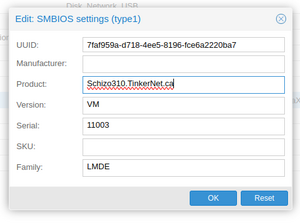Difference between revisions of "PVE Guest crash detection"
| Line 92: | Line 92: | ||
<span style="color: rgb(153, 51, 102);" >Now to just figure out how to check the guests times against the servers time...</span> | <span style="color: rgb(153, 51, 102);" >Now to just figure out how to check the guests times against the servers time...</span> | ||
I suspect I'll be writing some code to | I suspect I'll be writing some code to take the incoming data & put it in a file (or maybe multiple files) for handling. | ||
<span style="color: rgb(153, 51, 102);" >Then, if a guests time differs from the hosts time by more than a minute, it's likely crashed. Reset it.</span> | <span style="color: rgb(153, 51, 102);" >Then, if a guests time differs from the hosts time by more than a minute, it's likely crashed. Reset it.</span> | ||
Revision as of 18:41, 19 May 2024
The Problem
Sometimes VMs/LXCs crash & there's no way to have Proxmox detect & reset them...
Possible Solution(s)
Have the VM/LXC itself run a watchdog & send a message regularly to Proxmox.
Then...
Have Proxmox watch for stale messages & reset any VMs/LXCs that are out of date by some specific time limit.
Questions
What messaging tools are built-in to Proxmox AND suitable?
One option is MQTT. But I'd rather keep this entirely contained to the PVE server itself.
Something using ncat might be best.
(That's ncat, not netcat... netcat doesn't work...)
sudo apt install ncat
Thoughts
On the guests
So far, working with a Debian LXC and LMDE & Mint-21 VMs...
Finding relevant info about guests
VMID of a container can be found in /etc/mtab via script:
VMID=`cat /etc/mtab | grep '/dev/mapper/' | head -n1 | cut -d'-' -f4`PVEHOST=Schizo310.TinkerNet.caTYPE=CT
For VMs, you'll need to put it into the SMBIOS Settings under Options (maybe there's a way to automate this?) & then read it in via script using dmidecode:
VMID=`/usr/sbin/dmidecode -s system-serial-number`PVEHOST=`/usr/sbin/dmidecode -s system-product-name`TYPE=`/usr/sbin/dmidecode -s system-version`
(Has to be done as root...)
Sending the info to the host
A shell script (/root/bin/watchdog) with the above variable settings and:
/usr/bin/echo -e $TYPE";"$VMID";"`/usr/bin/hostname -s`";"`/usr/bin/date +%s` | /usr/bin/ncat $PVEHOST 9999
a cron job sending something like:
- * * * * * /home/tinker/bin/watchdog
This cron line (in roots crontab) sends the guest type, the VMID, and the time expressed as seconds since the Epoch (1970-01-01 00:00 UTC) to port 9999 on the host.
On the PVE server
A similar cron task to that on the guests, but sending the server name instead of the guest VMID.
VMID=Schizo310TYPE=PVE
A continuously running service based on:
- ncat -kl schizo310 9999
A bit of code so far...
#! /bin/bash
while read line
do
IFS=';' read -ra datum <<< "$line"
echo -e ${datum[0]} "\t" ${datum[1]} " \t" ${datum[3]} "\t" ${datum[2]}
# echo ${datum[0]} # TYPE
# echo ${datum[1]} # VMID
# echo ${datum[2]} # HOSTNAME
# echo ${datum[3]} # TIME
done < <(ncat -kl Schizo310.TinkerNet.ca 9999)
An example of the messages
root@schizo310:~/bin# watcher
VM 1001 1716161760 pfSense310
CT 11004 1716161761 pubkey-test
CT 11001 1716161761 LibreSpeed310
VM 1201 1716161761 manager310
CT 11002 1716161761 NetCat-Tst-CLI
PVE Schizo310 1716161761 schizo310
CT 1022 1716161761 Grafana
VM 11003 1716161761 LMDE-6
CT 1050 1716161761 FTPd
CT 1010 1716161761 MQTT
VM 11005 1716161761 Mint-21-Tst
CT 1040 1716161761 FileStore
CT 10022 1716161761 BlogNabbit
CT 1030 1716161761 Apache
CT 1032 1716161761 Apache-again
CT 1015 1716161761 Node-Red
CT 9060 1716161761 KittyCam
CT 1021 1716161761 InfluxDB
CT 1020 1716161761 MariaDBNext Steps
Now to just figure out how to check the guests times against the servers time...
I suspect I'll be writing some code to take the incoming data & put it in a file (or maybe multiple files) for handling.
Then, if a guests time differs from the hosts time by more than a minute, it's likely crashed. Reset it.
Ncat Caveats
Ncat, by default is a complete moron about DNS...
This appears to be some sort of bug in the GNU C compiler library NSS implementation.
If you start Ncat as a listener using the machines hostname, it has a good chance of binding to 127.0.1.1 instead of the machines actual IP address. This means it will never see incoming messages over the network. You can check if this is what it's doing by adding a -v option to the command line.
The solution when this happens is to edit /etc/nsswitch.conf and change the hosts line to remove files as an option (or, at least, move dns to the first position).
pfSense VMs
This seems to work under pfSense too.
BUT, requires installation of the nmap package and the watchdog script needs editing of the command locations.
#! /bin/sh PVEHOST=`/usr/local/sbin/dmidecode -s system-product-name` VMID=`/usr/local/sbin/dmidecode -s system-serial-number` TYPE=`/usr/local/sbin/dmidecode -s system-version` echo -e $TYPE";"$VMID";"`/bin/hostname -s`";"`/bin/date +%s` | /usr/local/bin/ncat $PVEHOST 9999
Windows VMs
¯\_(ツ)_/¯
